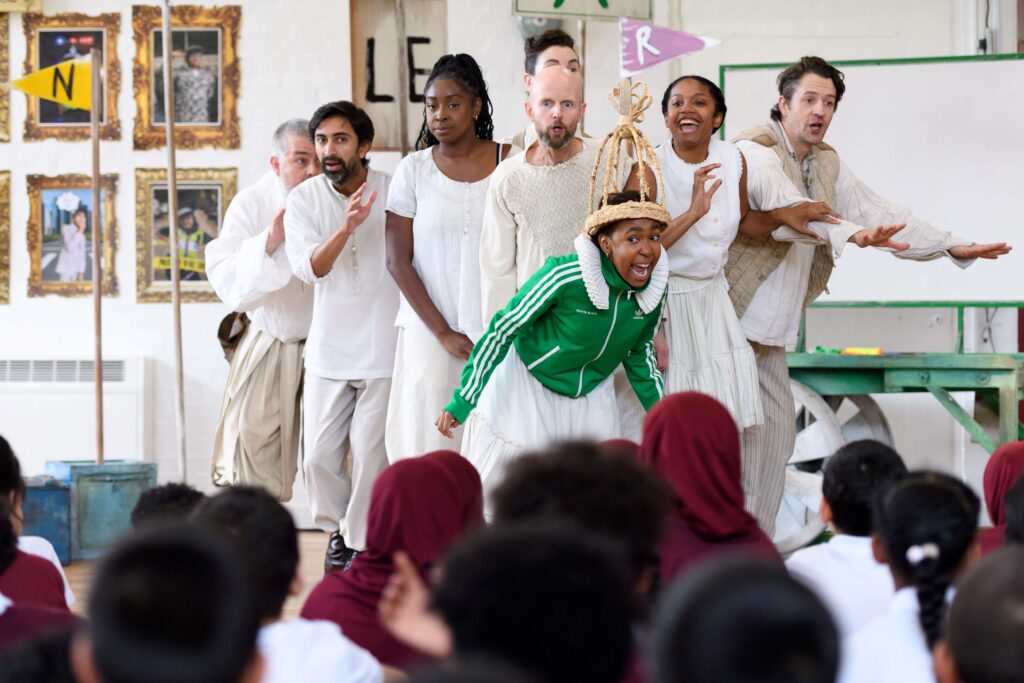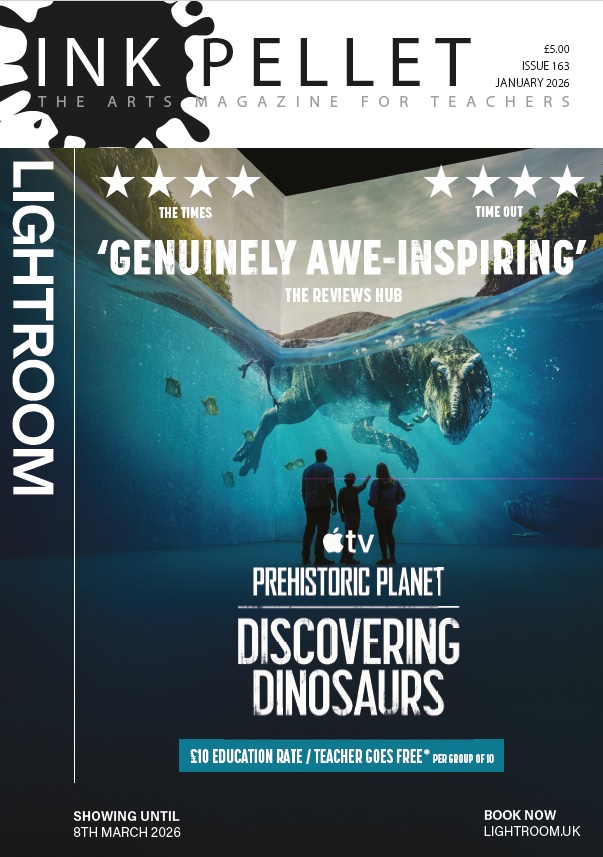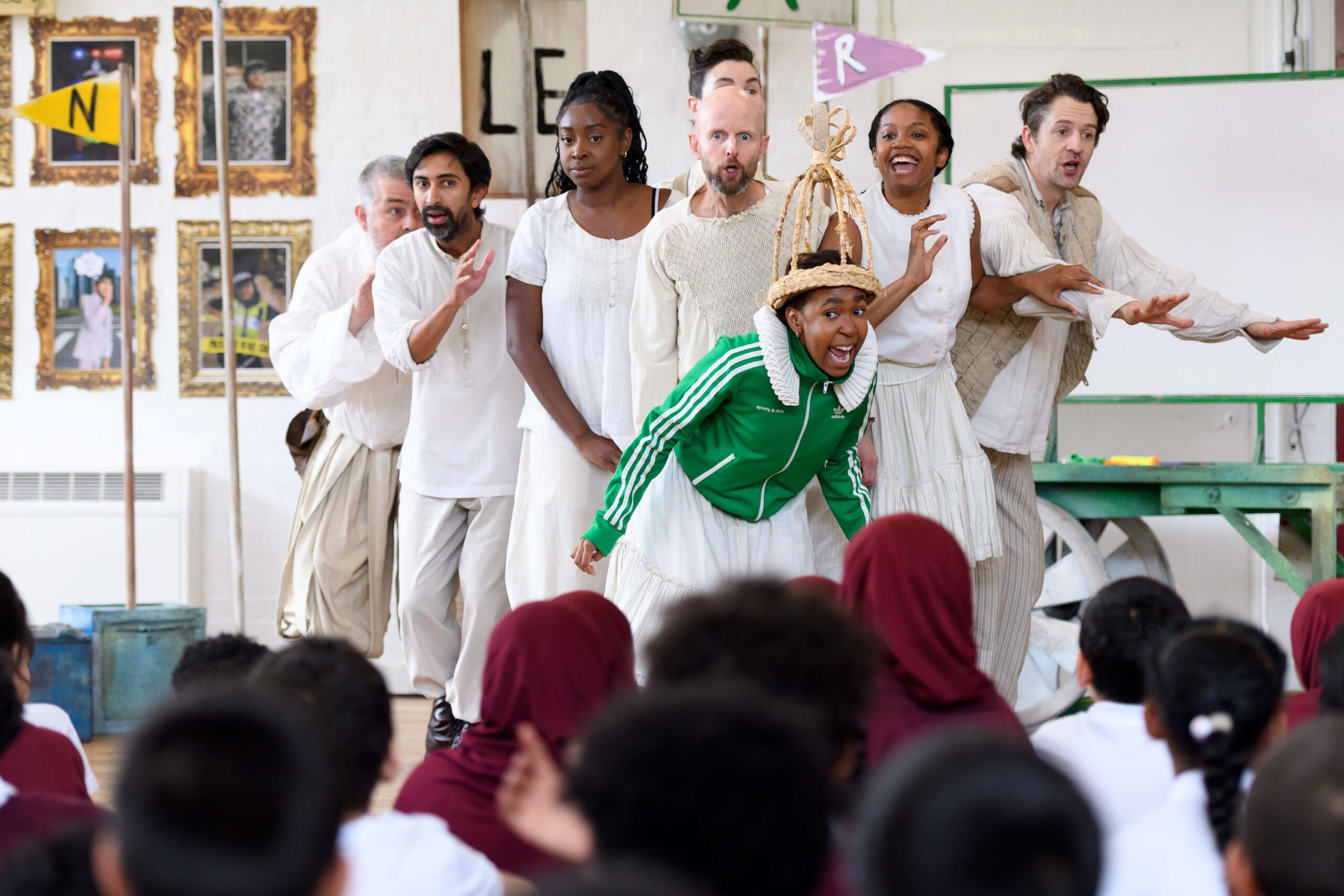Once more taking Shakespeare to schools and communities around the country, Susan Elkin caught up with the RSC in Birmingham for an inspiring afternoon.
“But nothing will come of nothing” called an irrepressible, totally engaged girl of about nine in response to Oliver Senton as a fine King Lear gasping his incredulous “Nothing?” in the opening love avowal scene. It was a most wonderful moment in a pretty wondrous afternoon.
I was as Percy Shurmer Academy in Birmingham with the Royal Shakespeare Company (RSC) for a sparky, imaginative performance of this year’s First Encounters play. Running for nearly twenty years, this project takes a short version of a play on tour to its partner primary schools all over the country – these are hubs so audiences can include children from other local schools, thereby increasing the reach. The plays are also staged in local theatres so that families can share them too. This year’s production will have reached 24,000 young people and their families when it completes its run on 12 December.
I ask director Justine Themen about the choice of play which doesn’t, at first glance, seem an obvious choice for primary school audiences. “We perform in secondary schools too, so we have to find a play which speaks to both age groups. We consulted widely with young people to identify the themes which really concern them. They are particularly interested in power relationships and would like teachers and parents to listen to their voices more. Coriolanus and Timon of Athens were the other two plays on my shortlist but in the end it was King Lear which really resonated.”
At the same time, Justine explains, it has to be a play which First Encounters hasn’t done for at least five years and one which will sell to all those partner theatres from Hall for Cornwall to Norwich Playhouse among others.
I watched it with a large, excited audience of years 4, 5 and 6 and their teachers. The production does everything possible to whip up enthusiasm. Nkhanise Phiri who then makes a good fist of playing both the fool and Cordelia mixes, bonds and romps with the audience cheerfully and playfully as teachers get the children into place and seated cross legged. At last the cast of eight enters, all clad in neutral cream, dramatically beating a big drum, wheeling their traditional players’ barrow and making lots of noise. Then finally they launch into a very abridged but effective account of the text bringing out timeless lines such as “like a scurvy politician” and “shut your mouth, Dame”. And of course, when it finally comes, Senton puts his own anguished spin on what is arguably Shakespeare’s most challenging line: “Never, never, never, never, never.” His pacing is admirable.
How do you do the blinding of Gloucester in a brightly lit school hall on a Thursday afternoon in Birmingham? Throw capsules of blue paint at Michele Moran‘s eyes, have her howling in quasi-operatic agony while the cast as ensemble holds her tightly all yapping like hostile dogs. It’s simple enough but “out vile jelly” is as convincing as ever. Not a child in the room laughed. Physicality drives the story telling.
Schools are provided with resource packs and there are support materials online so that children are well prepared. That little girl who joined in at the beginning, appeared to know the play as well as I do.
First Encounters has Arts Council funding and support from a wide range of trusts and foundations. At Percy Sturmer Academy I sat next to one of these trustees and his wife, both very keen to extend the ambit of the RSC. “Yes, our mission, always, is to take live theatre in general and Shakespeare in particular, into areas where there is no easy access to funded culture” says Justine, adding that this year’s King Lear is going to the Isle of Wight and the Isle of Sheppey, both new areas for First Encounters. “Additional funding was recently acquired which enabled the expansion of the schools network.”
King Lear has a notoriously bleak ending, however you present it. “But we wanted to leave our audiences with some hope for the future, so we always end with a bit of audience participation” says Justine. “After the applause, the actors invite children in the audience to say what they can, and will do, to improve things in the future.” At the performance I saw this was a warmly empowering moment with children speaking of things such as kindness, listening and tolerance.
www.rsc.org.uk/first-encounters-king-lear




